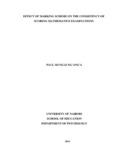| dc.description.abstract | It is common practice for secondary schools in Kenya to use common examinations to assess
students’ achievement. Proper monitoring of how formative assessment tests are typed and
administered is usually done by school administrators. The results of these examinations
must be fair and reliable as it is the only feedback given to students and parents. Little
attention however has been given to how teachers mark these school examinations and
therefore the validity of the scores given is always questionable. The study sought to examine
the effects of a marking scheme on the consistency of scoring mathematics examinations.
The objectives of the study were; to investigate the effect of a marking scheme on
consistency of scoring mathematics examinations in schools; to establish if moderation of a
marking scheme improves the consistency of scoring and to determine students’ factors that
may have any effect on consistency of scoring mathematics examinations. The study was
guided by classical test theory and positivist perspective of assessment. The research
employed descriptive research design. The target population was 156 mathematics teachers,
23 deans of studies and deputy principals in case a school did not have a dean of studies. A
sample of 57 teachers, 10 deans of studies and 2 deputy principals was taken for the study.
Descriptive statistics such as frequencies, percentages, means and standard deviations were
used to report the data. Cronbach alpha a coefficient for internal consistency was also
computed. The analysed data was presented in the form of frequency tables, bar graphs and
pie chart. The study revealed that when a common moderated marking scheme was used,
consistency of scoring mathematics improved. Organization of answers on the script,
Handwriting of the student, knowledge of student and previous performance affected how
teachers marked student work. However, personal feelings, gender, race, social class and
physical attractiveness of the students did not affect the way teachers in Makadara Subcounty
marked mathematics examinations. The study concluded that a well prepared marking
scheme enhances consistency of scoring especially if it is prepared and moderated by all
teachers marking the examination. The consistency could further be enhanced if a marking
scheme is piloted and any difference in interpretation is discussed and adjusted accordingly.
The study recommends proper training of teachers on essential assessment concepts,
principles, techniques and procedures by teachers training institutions. In addition, Ministry
of Education (MoE) in collaboration with Kenya National Examination Council (KNEC)
should organize workshop on setting and marking of examinations. Finally, research should
be conducted on the effects of feedback to examiners on consistency of scoring
examinations. This study should also be replicated in other sub-counties for the purpose of
comparing the study results. | en_US |

